Katheryn Thompson's Blog, page 15
July 31, 2018
July in Books
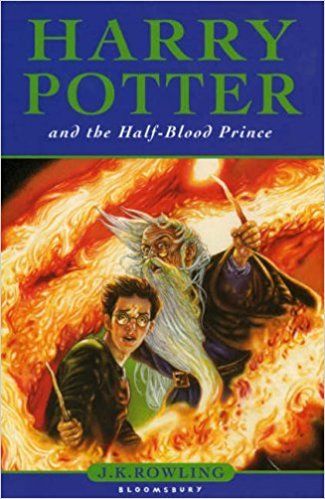
Harry Potter and the Half-Blood Prince
This is the book I enjoyed the least when I first read the series, so was pleasantly surprised by how much I enjoyed it this time around.
I also rewatched the film and, as with all book-to-film adaptations, have mixed feelings:
Pros: Harry under the influence of the Felix Felicis; the wand raising in memory of Dumbledore; the characterisation; Maggie Smith who completed this film while undergoing radio-therapy as treatment for breast cancer
Cons: how much is missed out especially in the way of sub-plots, character nuances, and links to the rest of the series; the struggle to see much of the film which is conducted in darkness
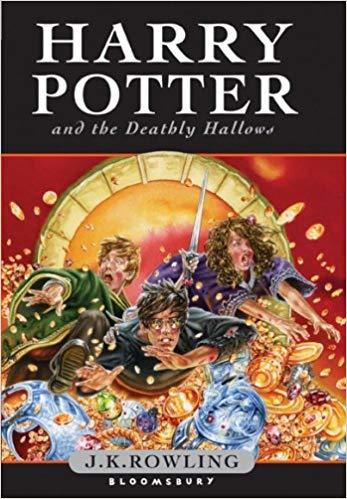
Harry Potter and the Deathly Hallows
Having re-read the series from Harry Potter and the Goblet of the Fire this summer, I had to finish it off with the final book. And I'm glad I did. While parts of it might be tough to read (especially the casualties of the final battle), Harry Potter and the Deathly Hallows is a brilliantly imaginative end to a brilliantly imaginative series. I'm sure I'll return to it next summer.

The New Urban Crisis: Gentrification, Housing Bubbles, Growing Inequality, and What We Can Do about It
A fascinating and highly relevant book about modern cities; specifically about rising housing costs and inequality, and how we can best tackle them. This surprisingly readable book will provide you with plently of material (from broader ideas to more specific facts and figures) for future thought and discussion.
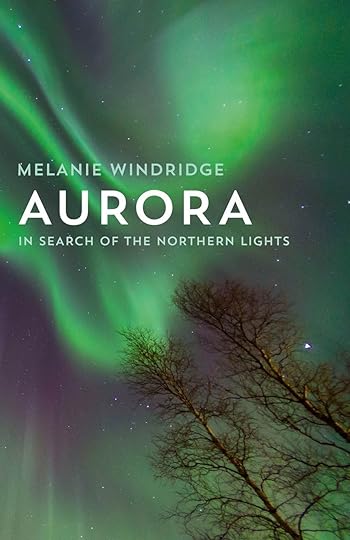
Aurora: In Search of the Northern Lights
I read Aurora while on a two-week cruise around Iceland, Norway, and Scotland, and it made for perfect holiday reading. This book is a wonderful mix of autobiography, travel, and science, and I was particularly impressed by Windridge's knack for explaining complicated science using everyday comparisons. A highly readable book about a fascinating phenomenon, Aurora is definitely one I would recommend if you're interested in learning more about the Northern Lights.

Othello
I found Othello to be a very melodramatic play but also a fairly readable one. I think it takes a bit of getting used to, from its racial undertones to the excessive passions of its characters, but is certainly a worthwhile read. I watched a fairly traditional production of Othello before reading it - something I always find useful with Shakespeare's plays.
Richard II
I watched the first episode of the Hollow Crown before reading this, and it was brilliant. I have no idea how I missed that series the first time around, but I'm definitely watching the rest of the episodes. As for the play itself, I was slightly hesitant about reading this one, thinking that Shakespeare's history plays would be drier than his comedies and tragedies, but I actually think this has become one of my favourites. It's perhaps subtler than some of his better-known plays, but the language is so beautiful, and very theatrical, and the main characters and plot are surprisingly relatable despite the royal setting.
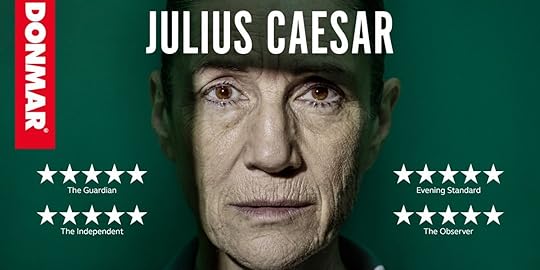
I also watched Donmar Warehouse's Julius Caesar. I was just expecting Julius Caesar but with women (which was fine by me), but this performance, set in a women's prison, is so much more than that. Very powerful stuff.
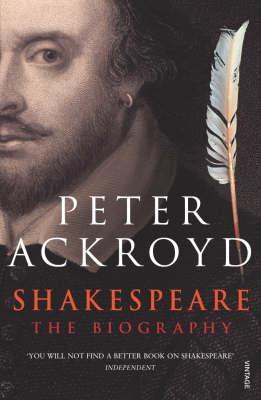
Shakespeare: The Biography
I'm still reading this one, but I'm almost finished and what I've read so far has been first-class. Watch this space.
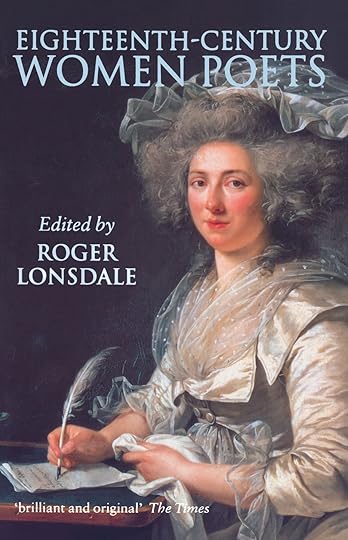
Eighteenth Century Women Poets: An Oxford Anthology
I think this one's going to take me a while to read, as I'm reading it in small sections, but I'm really looking forward to discovering these often-neglected poets.

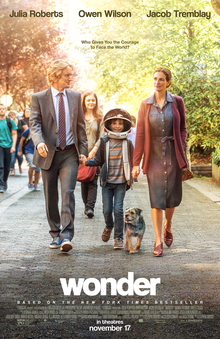
Ok, so I didn't technically read these, but I'm including them because I watched the films (which are based on books).
Everything, Everything was quite a slow film, and I found my attention drifting at times, but it was undeniably sweet and with an interesting premise (although I have to admit that I found the ending, which is supposedly happy, slightly disappointing).
I enjoyed Wonder much more; another feel-good film with a fresh perspective, which I would definitely recommend, but be prepared to have watery eyes throughout.
Published on July 31, 2018 13:42
July 23, 2018
10 Series I Keep Meaning to Finish
This post is inspired by 10 Series I Keep Saying I'll Finish Soon (I'm Lying So Bad) by @PaperFury (a.k.a. C.G. Drews).
1. James Bond series
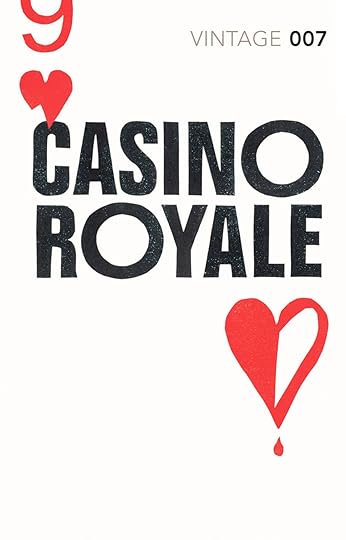
I love the James Bond films, and always watch them as soon as they are released, but I only got round to reading the first book, Casino Royale, this year, and haven't got any further yet, despite really enjoying it.
2. Valerie Hart series
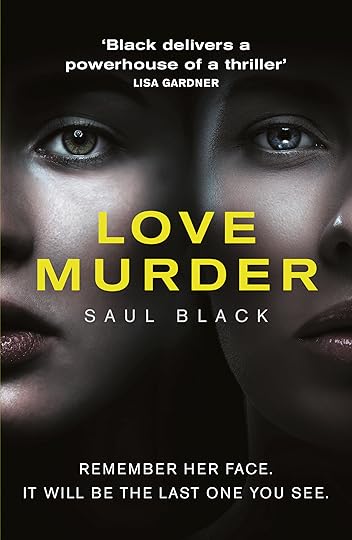
I only discovered this series this year, when I read the second in the series, Lovemurder, but I absolutely loved it and yet haven't read any more in the series yet (not even the first one).
3. Maigret series
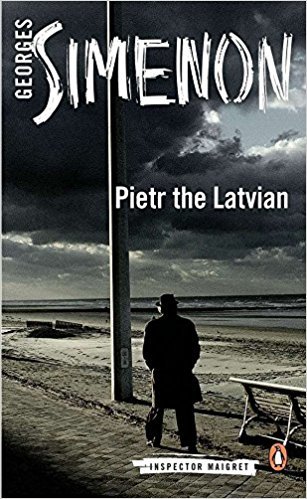
Having really enjoyed the Maigret TV episodes that I've watched, starring Rowan Atkinson, I read the first in the series, Pietr the Latvian, last year. It was a fairly short and thoroughly enjoyable read, and yet I still haven't read the next one.
4. D.I. Kim Stone series
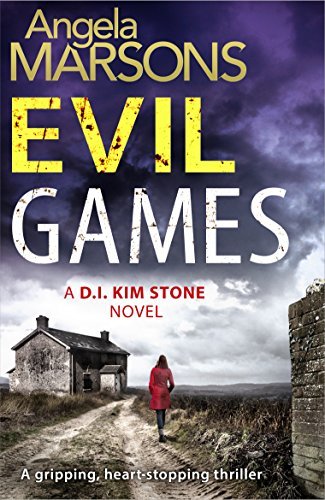
I discovered this series last year when I read the second book, Evil Games, and immediately resolved the read the rest of the series. Yet here I am.
5. Philip Marlowe series
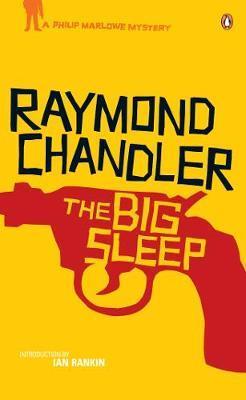
Raymond Chandler's crime noir series is a classic, and I fell in love with his style of writing when I read the first in the series, The Big Sleep, last year.
6. Harry Hole series
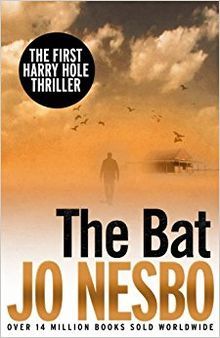
Jo Nesbø is synonymous with Scandi-noir thrillers, and I really enjoyed the first in his gritty series, The Bat, when I read it two years ago. I've also had his Macbeth on my to-read list for far too long.
7. Benson and De Vere series
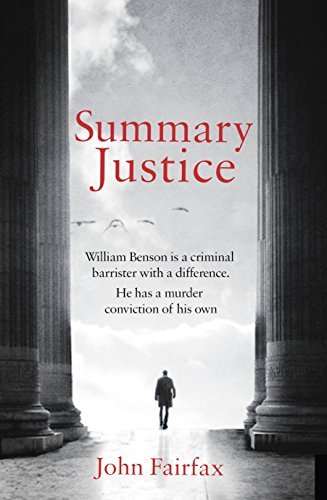
After winning the second in the series, Summary Justice, in a Goodreads giveaway, I bought and read its predecessor, Blind Defence. It was a fantastic read (I love its original twist on a familiar genre), which set up what looks to be a very promising series, yet, despite owning the next book in the series, I still haven't read it.
8. In Death series

I love the In Death series, and have read an incredible forty-five books in the series, but am currently one behind, with another book in the series due out in September, having not yet read Dark in Death.
9. A Series of Unfortunate Events series
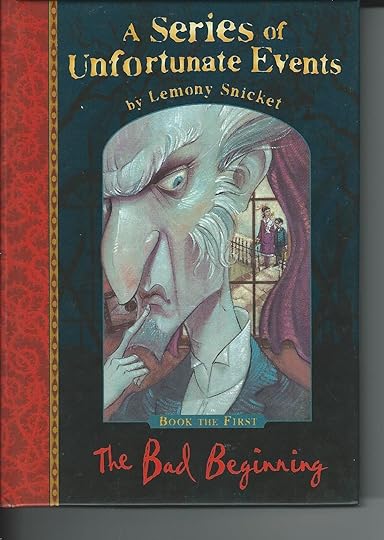
My friends rave about this series, but it somehow managed to pass me by when I was growing up.
10. Inspector Morse series

Since I go to Oxford University, and have done now for three years, I feel like I'm letting the side down by never having read any of the Inspector Morse series.
1. James Bond series

I love the James Bond films, and always watch them as soon as they are released, but I only got round to reading the first book, Casino Royale, this year, and haven't got any further yet, despite really enjoying it.
2. Valerie Hart series

I only discovered this series this year, when I read the second in the series, Lovemurder, but I absolutely loved it and yet haven't read any more in the series yet (not even the first one).
3. Maigret series

Having really enjoyed the Maigret TV episodes that I've watched, starring Rowan Atkinson, I read the first in the series, Pietr the Latvian, last year. It was a fairly short and thoroughly enjoyable read, and yet I still haven't read the next one.
4. D.I. Kim Stone series

I discovered this series last year when I read the second book, Evil Games, and immediately resolved the read the rest of the series. Yet here I am.
5. Philip Marlowe series

Raymond Chandler's crime noir series is a classic, and I fell in love with his style of writing when I read the first in the series, The Big Sleep, last year.
6. Harry Hole series

Jo Nesbø is synonymous with Scandi-noir thrillers, and I really enjoyed the first in his gritty series, The Bat, when I read it two years ago. I've also had his Macbeth on my to-read list for far too long.
7. Benson and De Vere series

After winning the second in the series, Summary Justice, in a Goodreads giveaway, I bought and read its predecessor, Blind Defence. It was a fantastic read (I love its original twist on a familiar genre), which set up what looks to be a very promising series, yet, despite owning the next book in the series, I still haven't read it.
8. In Death series

I love the In Death series, and have read an incredible forty-five books in the series, but am currently one behind, with another book in the series due out in September, having not yet read Dark in Death.
9. A Series of Unfortunate Events series

My friends rave about this series, but it somehow managed to pass me by when I was growing up.
10. Inspector Morse series

Since I go to Oxford University, and have done now for three years, I feel like I'm letting the side down by never having read any of the Inspector Morse series.
Published on July 23, 2018 02:25
July 3, 2018
June in Books
What have you read this month? Here's my June in books:

Wolf Hall
England in the 1520s is a heartbeat from disaster. If the king dies without a male heir, the country could be destroyed by civil war. Henry VIII wants to annul his marriage of twenty years and marry Anne Boleyn. The pope and most of Europe opposes him. Into this impasse steps Thomas Cromwell: a wholly original man, a charmer and a bully, both idealist and opportunist, astute in reading people, and implacable in his ambition. But Henry is volatile: one day tender, one day murderous. Cromwell helps him break the opposition, but what will be the price of his triumph?
Three and a half stars. There were moments that made me hesitate, and at times I felt like I was persevering, but it was worth it for Mantel's Cromwell.
If you enjoyed this, I'd recommend Conspiracy by S.J. Parris

Transit
In the wake of family collapse, a writer and her two young sons move to London. The process of upheaval is the catalyst for a number of transitions—personal, moral, artistic, practical—as she endeavors to construct a new reality for herself and her children. In the city she is made to confront aspects of living she has, until now, avoided, and to consider questions of vulnerability and power, death and renewal, in what becomes her struggle to reattach herself to, and believe in, life.
Three stars. Perhaps it's my own fault for starting with the second in the trilogy, but this one, with its incomplete protagonist and overtly literary reflectiveness, didn't quite hit the mark for me.

The Mark and the Void
Claude is a Frenchman who lives in Dublin. His birthplace is famed as the city of lovers, but so far love has always eluded him. Instead his life revolves around the investment bank where he works. And then one day he realizes he is being followed around, by a pale, scrawny man. The man's name is Paul Murray. Paul claims to want to write a novel about Claude and Claude's heart sings. Finally, a chance to escape the drudgery of his everyday office life, to be involved in writing, in art! But Paul himself seems more interested in where the bank keeps its money than in Claude - and soon Claude realizes that Paul is not all he appears to be.
Four and a half stars. Come for the beautiful cover, stay for the thoughtful wit.
If you enjoyed this, I'd recommend Waiting For Monsieur Bellivier and Purity
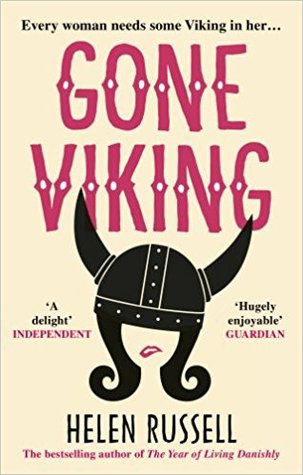
Gone Viking
Frazzled mum Alice Ray likes to think she’s on top everything – she has FOUR bags-for-life in the boot of her car for heaven's sake. But after spectacularly embarrassing herself at work, she finally gives in to her sister’s pleas to take a much needed break. But this is not the luxury spa holiday Alice hoped for – instead, she finds herself in Denmark, in the middle of nowhere, on a ‘How to be a Viking’ getaway. Can the two sisters finally learn to get along or will learning to embrace their inner warrior just make them better at fighting?
Three stars. A wonderful concept with brilliant, and realistic, characterisation, but, unfortunately, not as witty and engaging as I'd hoped. (Although, please note that I did read an advance reading copy).
If you enjoyed this, I'd recommend Today Will Be Different

Harry Potter and the Goblet of Fire
Harry Potter is midway through his training as a wizard and his coming of age. Harry wants to get away from the pernicious Dursleys and go to the International Quidditch Cup. He wants to find out about the mysterious event that's supposed to take place at Hogwarts this year, an event involving two other rival schools of magic, and a competition that hasn't happened for a hundred years. He wants to be a normal, fourteen-year-old wizard. But unfortunately for Harry Potter, he's not normal - even by wizarding standards. And in his case, different can be deadly.
Five stars. Returning to the magical world of Harry Potter is something I look forward to every summer, and I started with the fourth book because I read the first three last summer. It's impossible to pick a favourite from the series, but Harry Potter and the Goblet of Fire is definitely up there; I love the Triwizard Tournament, and in particular how Hermione explains Ron's reaction to Harry being chosen to compete, how Harry deals with the second task, and what Harry does with his winnings.

Paradise Regained
While Paradise Lost tells the story of the fall of man, how Satan tempted Adam and Eve and caused them to eat from the forbidden tree of knowledge and thus to be expelled from the Garden of Eden, its sequel tells the story of Christ's fasting in the desert. The premise of Paradise Regained is that mankind recovers Paradise by Christ's ability to resist the temptations of Satan; it having been lost by Satan's success in tempting Adam and Eve.
Four stars. Interestingly, Milton preferred his final epic to Paradise Lost and could not bear to hear it disparaged, yet it was less popular when it first appeared, and has remained so throughout its critical history. I have put off reading Paradise Regained for too long, and was pleasantly surprised by it, but I still have to side with the general consensus in my preference for Paradise Lost. I would, however, recommend its lesser-known sequel to anyone who has read and enjoyed Paradise Lost, since it is still a very interesting read (especially in its relationship to its epic predecessor), and only four books long.

Harry Potter and the Order of the Phoenix
Harry Potter and the Order of the Phoenix is the fifth novel in the Harry Potter series. It follows Harry Potter's struggles through his fifth year at Hogwarts School of Witchcraft and Wizardry, including the surreptitious return of the antagonist Lord Voldemort, O.W.L. exams, and an obstructive Ministry of Magic.
Five stars. I adore the character of Umbridge (any character I can feel that much hatred for is a character well created), and I also like this book's move towards a darker tone. While I enjoy the film adaptations, it always annoys me how many of the book's nuances they miss out (as well as some brilliant lines of dialogue), and Harry Potter and the Order of the Phoenix is particularly subtle in its foreshadowing and tying together of loose ends. I also love Fred and George's farewell to Hogwarts.

The New Urban Crisis
Our cities drive innovation and growth, but they also propel us into housing crises and give rise to ever-greater inequality, as the super-rich displace the well-off and the workers who run our essential services are ghettoised and pushed out to the suburbs. There is a new urban crisis, and it is undermining the foundations of our society. In this bracingly original work of research and analysis, leading urbanist Richard Florida demonstrates how our cities are evolving in the twenty-first century, for good and for ill. From the world's superstar metropolises to the urban slums of the developing world, he shows how the crisis touches all of us, and sets out how we can make our cities more inclusive, ensuring prosperity for all.
I'm still reading this one, although what I have read has certainly captured my interest. This promises to be a really fascinating, and relevant book, and my original concern that it would be too focused on America does not seem to be true.

Wolf Hall
England in the 1520s is a heartbeat from disaster. If the king dies without a male heir, the country could be destroyed by civil war. Henry VIII wants to annul his marriage of twenty years and marry Anne Boleyn. The pope and most of Europe opposes him. Into this impasse steps Thomas Cromwell: a wholly original man, a charmer and a bully, both idealist and opportunist, astute in reading people, and implacable in his ambition. But Henry is volatile: one day tender, one day murderous. Cromwell helps him break the opposition, but what will be the price of his triumph?
Three and a half stars. There were moments that made me hesitate, and at times I felt like I was persevering, but it was worth it for Mantel's Cromwell.
If you enjoyed this, I'd recommend Conspiracy by S.J. Parris

Transit
In the wake of family collapse, a writer and her two young sons move to London. The process of upheaval is the catalyst for a number of transitions—personal, moral, artistic, practical—as she endeavors to construct a new reality for herself and her children. In the city she is made to confront aspects of living she has, until now, avoided, and to consider questions of vulnerability and power, death and renewal, in what becomes her struggle to reattach herself to, and believe in, life.
Three stars. Perhaps it's my own fault for starting with the second in the trilogy, but this one, with its incomplete protagonist and overtly literary reflectiveness, didn't quite hit the mark for me.

The Mark and the Void
Claude is a Frenchman who lives in Dublin. His birthplace is famed as the city of lovers, but so far love has always eluded him. Instead his life revolves around the investment bank where he works. And then one day he realizes he is being followed around, by a pale, scrawny man. The man's name is Paul Murray. Paul claims to want to write a novel about Claude and Claude's heart sings. Finally, a chance to escape the drudgery of his everyday office life, to be involved in writing, in art! But Paul himself seems more interested in where the bank keeps its money than in Claude - and soon Claude realizes that Paul is not all he appears to be.
Four and a half stars. Come for the beautiful cover, stay for the thoughtful wit.
If you enjoyed this, I'd recommend Waiting For Monsieur Bellivier and Purity

Gone Viking
Frazzled mum Alice Ray likes to think she’s on top everything – she has FOUR bags-for-life in the boot of her car for heaven's sake. But after spectacularly embarrassing herself at work, she finally gives in to her sister’s pleas to take a much needed break. But this is not the luxury spa holiday Alice hoped for – instead, she finds herself in Denmark, in the middle of nowhere, on a ‘How to be a Viking’ getaway. Can the two sisters finally learn to get along or will learning to embrace their inner warrior just make them better at fighting?
Three stars. A wonderful concept with brilliant, and realistic, characterisation, but, unfortunately, not as witty and engaging as I'd hoped. (Although, please note that I did read an advance reading copy).
If you enjoyed this, I'd recommend Today Will Be Different

Harry Potter and the Goblet of Fire
Harry Potter is midway through his training as a wizard and his coming of age. Harry wants to get away from the pernicious Dursleys and go to the International Quidditch Cup. He wants to find out about the mysterious event that's supposed to take place at Hogwarts this year, an event involving two other rival schools of magic, and a competition that hasn't happened for a hundred years. He wants to be a normal, fourteen-year-old wizard. But unfortunately for Harry Potter, he's not normal - even by wizarding standards. And in his case, different can be deadly.
Five stars. Returning to the magical world of Harry Potter is something I look forward to every summer, and I started with the fourth book because I read the first three last summer. It's impossible to pick a favourite from the series, but Harry Potter and the Goblet of Fire is definitely up there; I love the Triwizard Tournament, and in particular how Hermione explains Ron's reaction to Harry being chosen to compete, how Harry deals with the second task, and what Harry does with his winnings.

Paradise Regained
While Paradise Lost tells the story of the fall of man, how Satan tempted Adam and Eve and caused them to eat from the forbidden tree of knowledge and thus to be expelled from the Garden of Eden, its sequel tells the story of Christ's fasting in the desert. The premise of Paradise Regained is that mankind recovers Paradise by Christ's ability to resist the temptations of Satan; it having been lost by Satan's success in tempting Adam and Eve.
Four stars. Interestingly, Milton preferred his final epic to Paradise Lost and could not bear to hear it disparaged, yet it was less popular when it first appeared, and has remained so throughout its critical history. I have put off reading Paradise Regained for too long, and was pleasantly surprised by it, but I still have to side with the general consensus in my preference for Paradise Lost. I would, however, recommend its lesser-known sequel to anyone who has read and enjoyed Paradise Lost, since it is still a very interesting read (especially in its relationship to its epic predecessor), and only four books long.

Harry Potter and the Order of the Phoenix
Harry Potter and the Order of the Phoenix is the fifth novel in the Harry Potter series. It follows Harry Potter's struggles through his fifth year at Hogwarts School of Witchcraft and Wizardry, including the surreptitious return of the antagonist Lord Voldemort, O.W.L. exams, and an obstructive Ministry of Magic.
Five stars. I adore the character of Umbridge (any character I can feel that much hatred for is a character well created), and I also like this book's move towards a darker tone. While I enjoy the film adaptations, it always annoys me how many of the book's nuances they miss out (as well as some brilliant lines of dialogue), and Harry Potter and the Order of the Phoenix is particularly subtle in its foreshadowing and tying together of loose ends. I also love Fred and George's farewell to Hogwarts.

The New Urban Crisis
Our cities drive innovation and growth, but they also propel us into housing crises and give rise to ever-greater inequality, as the super-rich displace the well-off and the workers who run our essential services are ghettoised and pushed out to the suburbs. There is a new urban crisis, and it is undermining the foundations of our society. In this bracingly original work of research and analysis, leading urbanist Richard Florida demonstrates how our cities are evolving in the twenty-first century, for good and for ill. From the world's superstar metropolises to the urban slums of the developing world, he shows how the crisis touches all of us, and sets out how we can make our cities more inclusive, ensuring prosperity for all.
I'm still reading this one, although what I have read has certainly captured my interest. This promises to be a really fascinating, and relevant book, and my original concern that it would be too focused on America does not seem to be true.
Published on July 03, 2018 07:31
June 28, 2018
Books for the Heatwave
A heatwave hits Britain. A confused and sticky population begins to panic buy random items out of fear and sweaty uncertainty. One man runs into a shop and buys 6 ice creams and a tennis racket. Why? Heat madness. Help us. @TechnicallyRon
Here are some book suggestions to help you survive the heatwave:
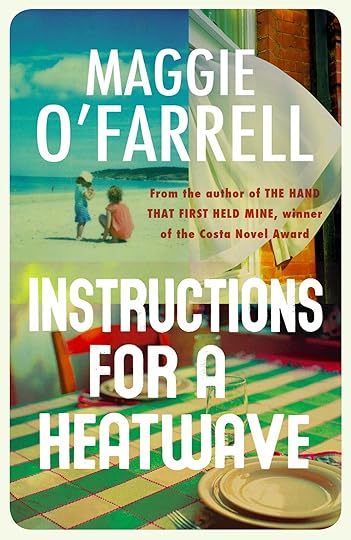
Instructions for a Heatwave
Gretta Riordan wakes on a stultifying July morning to find that her husband of forty years has gone to get the paper and vanished, cleaning out his bank account along the way. Gretta's three grown children converge on their parents' home for the first time in years: Michael Francis, a history teacher whose marriage is failing; Monica, with two stepdaughters who despise her and a blighted past that has driven away the younger sister she once adored; and Aoife, the youngest, now living in Manhattan, a smart, immensely resourceful young woman who has arranged her entire life to conceal a devastating secret.
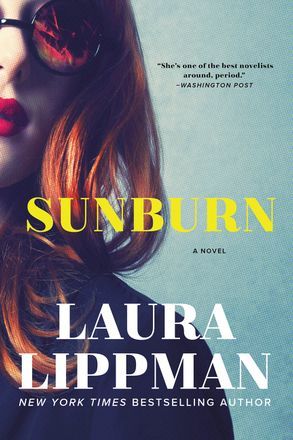
Sunburn
They meet at a local tavern in the small town of Belleville, Delaware. Polly is set on heading west. Adam says he’s also passing through. Yet she stays and he stays—drawn to this mysterious redhead whose quiet stillness both unnerves and excites him. Over the course of a punishing summer, Polly and Adam abandon themselves to a steamy, inexorable affair. Still, each holds something back from the other—dangerous, even lethal, secrets that begin to accumulate as autumn approaches, feeding the growing doubts they conceal.
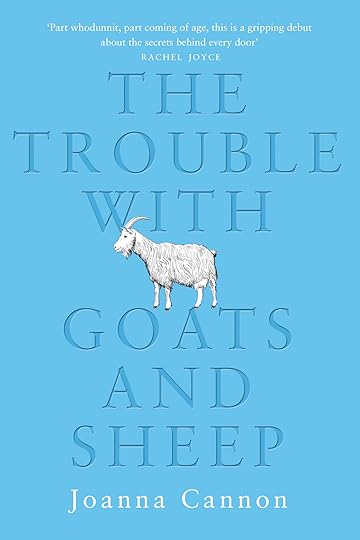
The Trouble with Goats and Sheep
England, 1976. Mrs. Creasy is missing and the Avenue is alive with whispers. The neighbors blame her sudden disappearance on the heat wave, but ten-year-olds Grace and Tilly aren’t convinced. As the summer shimmers endlessly on, the girls decide to take matters into their own hands. Inspired by the local vicar, they go looking for God—they believe that if they find Him they might also find Mrs. Creasy and bring her home.
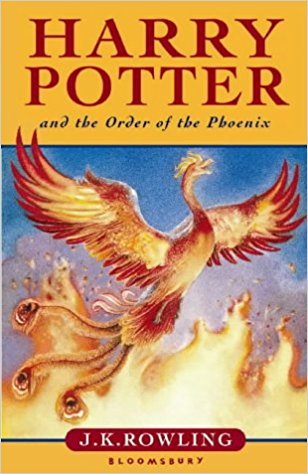
Harry Potter and the Order of the Phoenix
Harry Potter is due to start his fifth year at Hogwarts School of Witchcraft and Wizardry. His best friends Ron and Hermione have been very secretive all summer and he is desperate to get back to school and find out what has been going on. However, what Harry discovers is far more devastating than he could ever have expected.

Coldmaker
Eight hundred years ago, the Jadans angered the Crier. In punishment, the Crier took their Cold away, condemning them to a life of enslavement in a world bathed in heat. Or so the tale goes. During the day, as the Sun blazes over his head, Micah leads the life of any Jadan slave, running errands through the city of Paphos at the mercy of the petty Nobles and ruthless taskmasters. But after the evening bells have tolled and all other Jadans sleep, Micah escapes into the night in search of scraps and broken objects, which once back inside his barracks he tinkers into treasures. However, when a mysterious masked Jadan publicly threatens Noble authority, a wave of rebellion ripples through the city. With Paphos plunged into turmoil, Micah’s secret is at risk of being exposed. And another, which has been waiting hundreds of years to be found, is also on the verge of discovery.

Heat Wave
Pauline is spending the summer at World's End, a cottage somewhere in the middle of England. This year the adjoining cottage is occupied by her daughter Teresa and baby grandson Luke; and, of course, Maurice, the man Teresa married. As the hot months unfold, Maurice grows ever more involved in the book he is writing - and with his female copy editor - and Pauline can only watch in dismay and anger as her daughter repeats her own mistakes in love. The heat and tension will lead to a violent, startling climax.
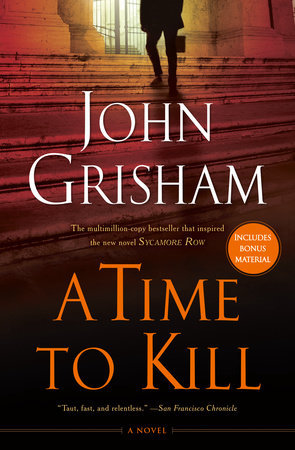
A Time to Kill
The life of a ten-year-old girl is shattered by two drunken and remorseless young men. The mostly white town reacts with shock and horror at the inhuman crime. Until her black father acquires an assault rifle and takes matters into his hands. For ten days, as burning crosses and the crack of sniper fire spread through the streets of Clanton, the nation sits spellbound as young defense attorney Jake Brigance struggles to save his client's life...and then his own.
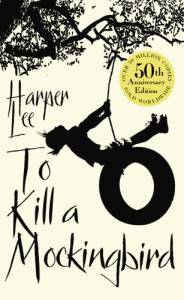
To Kill a Mockingbird
'Shoot all the bluejays you want, if you can hit 'em, but remember it's a sin to kill a mockingbird.' A lawyer's advice to his children as he defends the real mockingbird of Harper Lee's classic novel - a black man charged with the rape of a white girl. Through the young eyes of Scout and Jem Finch, Harper Lee explores with exuberant humour the irrationality of adult attitudes to race and class in the Deep South of the thirties. The conscience of a town steeped in prejudice, violence and hypocrisy is pricked by the stamina of one man's struggle for justice. But the weight of history will only tolerate so much.
Here are some book suggestions to help you survive the heatwave:

Instructions for a Heatwave
Gretta Riordan wakes on a stultifying July morning to find that her husband of forty years has gone to get the paper and vanished, cleaning out his bank account along the way. Gretta's three grown children converge on their parents' home for the first time in years: Michael Francis, a history teacher whose marriage is failing; Monica, with two stepdaughters who despise her and a blighted past that has driven away the younger sister she once adored; and Aoife, the youngest, now living in Manhattan, a smart, immensely resourceful young woman who has arranged her entire life to conceal a devastating secret.

Sunburn
They meet at a local tavern in the small town of Belleville, Delaware. Polly is set on heading west. Adam says he’s also passing through. Yet she stays and he stays—drawn to this mysterious redhead whose quiet stillness both unnerves and excites him. Over the course of a punishing summer, Polly and Adam abandon themselves to a steamy, inexorable affair. Still, each holds something back from the other—dangerous, even lethal, secrets that begin to accumulate as autumn approaches, feeding the growing doubts they conceal.

The Trouble with Goats and Sheep
England, 1976. Mrs. Creasy is missing and the Avenue is alive with whispers. The neighbors blame her sudden disappearance on the heat wave, but ten-year-olds Grace and Tilly aren’t convinced. As the summer shimmers endlessly on, the girls decide to take matters into their own hands. Inspired by the local vicar, they go looking for God—they believe that if they find Him they might also find Mrs. Creasy and bring her home.

Harry Potter and the Order of the Phoenix
Harry Potter is due to start his fifth year at Hogwarts School of Witchcraft and Wizardry. His best friends Ron and Hermione have been very secretive all summer and he is desperate to get back to school and find out what has been going on. However, what Harry discovers is far more devastating than he could ever have expected.

Coldmaker
Eight hundred years ago, the Jadans angered the Crier. In punishment, the Crier took their Cold away, condemning them to a life of enslavement in a world bathed in heat. Or so the tale goes. During the day, as the Sun blazes over his head, Micah leads the life of any Jadan slave, running errands through the city of Paphos at the mercy of the petty Nobles and ruthless taskmasters. But after the evening bells have tolled and all other Jadans sleep, Micah escapes into the night in search of scraps and broken objects, which once back inside his barracks he tinkers into treasures. However, when a mysterious masked Jadan publicly threatens Noble authority, a wave of rebellion ripples through the city. With Paphos plunged into turmoil, Micah’s secret is at risk of being exposed. And another, which has been waiting hundreds of years to be found, is also on the verge of discovery.

Heat Wave
Pauline is spending the summer at World's End, a cottage somewhere in the middle of England. This year the adjoining cottage is occupied by her daughter Teresa and baby grandson Luke; and, of course, Maurice, the man Teresa married. As the hot months unfold, Maurice grows ever more involved in the book he is writing - and with his female copy editor - and Pauline can only watch in dismay and anger as her daughter repeats her own mistakes in love. The heat and tension will lead to a violent, startling climax.

A Time to Kill
The life of a ten-year-old girl is shattered by two drunken and remorseless young men. The mostly white town reacts with shock and horror at the inhuman crime. Until her black father acquires an assault rifle and takes matters into his hands. For ten days, as burning crosses and the crack of sniper fire spread through the streets of Clanton, the nation sits spellbound as young defense attorney Jake Brigance struggles to save his client's life...and then his own.

To Kill a Mockingbird
'Shoot all the bluejays you want, if you can hit 'em, but remember it's a sin to kill a mockingbird.' A lawyer's advice to his children as he defends the real mockingbird of Harper Lee's classic novel - a black man charged with the rape of a white girl. Through the young eyes of Scout and Jem Finch, Harper Lee explores with exuberant humour the irrationality of adult attitudes to race and class in the Deep South of the thirties. The conscience of a town steeped in prejudice, violence and hypocrisy is pricked by the stamina of one man's struggle for justice. But the weight of history will only tolerate so much.
Published on June 28, 2018 09:11
June 20, 2018
10 Books I've Read Away From Home
This blog post is inspired by @PaperFury's '10 Books I've Read While Outside (Translation: Being Dragged Out Of) My House'. One of my favourite things about reading is being able to look back and associate certain books with certain memories, so here are my 10 books I've read away from home:
1. The Mark and the Void: read on a beach in Bodrum, Turkey

I spent my birthday this year in Bodrum, where I read several books on the beach (I can think of worst ways to spend my birthday), including the witty and thoughtful The Mark and the Void.
2. Memorial: An Excavation of the Iliad: read in a coffee shop

Memorial is a retelling of the Iliad featuring only paraphrased accounts of the battle deaths, and translations of Homer's similes. It's short enough to read in one sitting, so I read it in a coffee shop, which I would not recommend because it made me cry.
3. Pretend You Don't See Her: read at my grandparents' house

So I still read this one inside a house, but the reason I've included it is because this was the first Mary Higgins Clark book I ever read (and remains my favourite), and probably the first real thriller I ever read. I finished reading the book I'd brought to my grandparents' house, so I picked this off the shelf to try it, and didn't put it down until I'd finished.
4. The Vanishing Act of Esme Lennox: read on a plane to Budapest, Hungary

This was some years ago, when I went to Budapest on a school trip (it was with the art department, even though I had no intention of taking art). I had an amazing time, but one of my lasting memories of the trip is reading this brilliantly intricate and subtle book - partly because one of my friends sat watching me, in awe at the speed I was reading, for most of the journey.
5. Democracy and Its Crisis: read on a plane to Santiago, Chile
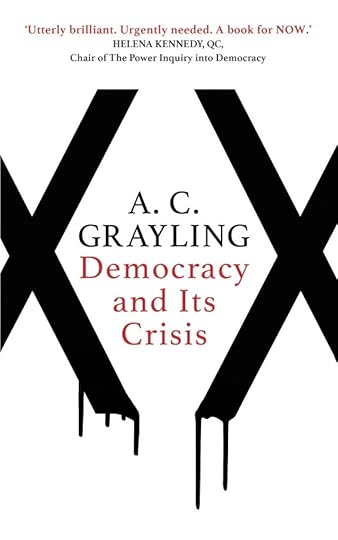
I went to Chile last December to visit a friend on her year abroad, and this is one of the books I took with me. It is a fascinating and thought-provoking read, and one I hoped made people who saw me reading it, in the airport and on the plane, realise that I was not a Brexiter.
6. The Reluctant Fundamentalist: read in New Delhi, India
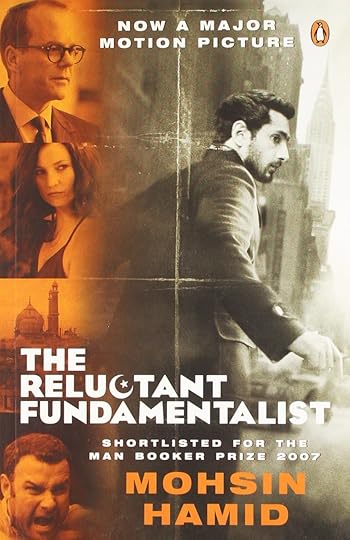
When I did a summer internship at The British School, New Delhi, one of the books I was teaching on was The Reluctant Fundamentalist, which I hadn't come across before. One of things I most enjoyed about my time at The British School was seeing how different their international curriculum was from that of my own school. This book, which consists of the sustained monologue of a young man in Lahore telling an American stranger about his experiences of life in America, before and after 9/11, is one example of that.
7. The Ice Beneath Her: read in a hotel in Glasgow
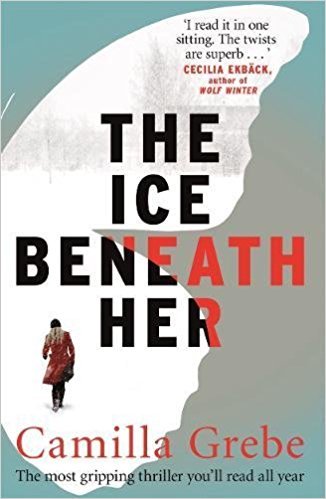
Since I go to bed much later than my parents, whenever I go away with them, there's plenty of opportunity to read at night. I devoured this thriller while on a long weekend away in Glasgow with them.
8. Ulysses: read (in part) on a cruise around the Mediterranean
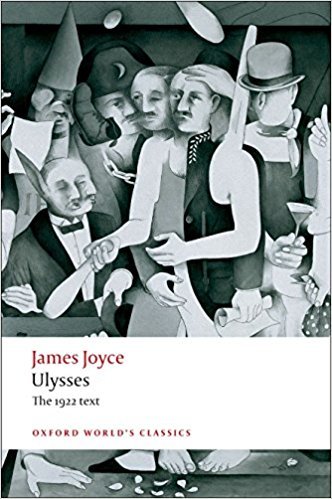
Ulysses was too long for me to read all in one place, but I read a good part of it while on a cruise around the Mediterranean. It was actually a library book that I took with me, and I like the idea that other people have and will read it in lots of different places too. It seems especially appropriate for a book like Ulysses.
9. The Awakening and Other Stories: read in Cambridge

I read the books we were going to study in English Literature A-Level in the summer before the new year started. I was at a summer school in Cambridge when I read The Awakening, staying at St. John's College. The summer school is an important memory to me, because it helped me to realise that I wanted to read Classics and English at University (having not really understood what Classics was up until this point), and I'm glad that memory is associated with a good book.
10. The Gene: An Intimate History: read in Swansea
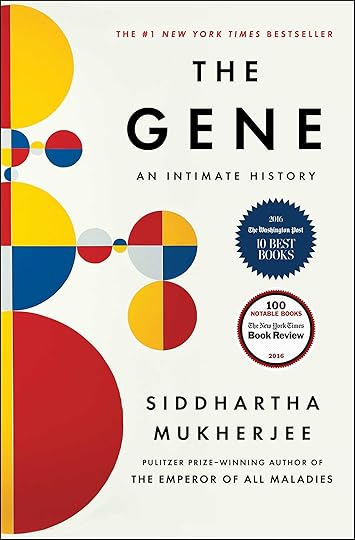
I bought this book last year on my birthday (with money I was given as a birthday present), and I have fond memories of spending a good chunk of my birthday wandering around Waterstone's, choosing the right book. I definitely made the right choice with The Gene: An Intimate History, which I think is one of the best books I've ever read, and I read most of it while on a family holiday in Swansea (although I'm not sure how much my family enjoyed being told facts about genes throughout the holiday).
1. The Mark and the Void: read on a beach in Bodrum, Turkey

I spent my birthday this year in Bodrum, where I read several books on the beach (I can think of worst ways to spend my birthday), including the witty and thoughtful The Mark and the Void.
2. Memorial: An Excavation of the Iliad: read in a coffee shop

Memorial is a retelling of the Iliad featuring only paraphrased accounts of the battle deaths, and translations of Homer's similes. It's short enough to read in one sitting, so I read it in a coffee shop, which I would not recommend because it made me cry.
3. Pretend You Don't See Her: read at my grandparents' house

So I still read this one inside a house, but the reason I've included it is because this was the first Mary Higgins Clark book I ever read (and remains my favourite), and probably the first real thriller I ever read. I finished reading the book I'd brought to my grandparents' house, so I picked this off the shelf to try it, and didn't put it down until I'd finished.
4. The Vanishing Act of Esme Lennox: read on a plane to Budapest, Hungary

This was some years ago, when I went to Budapest on a school trip (it was with the art department, even though I had no intention of taking art). I had an amazing time, but one of my lasting memories of the trip is reading this brilliantly intricate and subtle book - partly because one of my friends sat watching me, in awe at the speed I was reading, for most of the journey.
5. Democracy and Its Crisis: read on a plane to Santiago, Chile

I went to Chile last December to visit a friend on her year abroad, and this is one of the books I took with me. It is a fascinating and thought-provoking read, and one I hoped made people who saw me reading it, in the airport and on the plane, realise that I was not a Brexiter.
6. The Reluctant Fundamentalist: read in New Delhi, India

When I did a summer internship at The British School, New Delhi, one of the books I was teaching on was The Reluctant Fundamentalist, which I hadn't come across before. One of things I most enjoyed about my time at The British School was seeing how different their international curriculum was from that of my own school. This book, which consists of the sustained monologue of a young man in Lahore telling an American stranger about his experiences of life in America, before and after 9/11, is one example of that.
7. The Ice Beneath Her: read in a hotel in Glasgow

Since I go to bed much later than my parents, whenever I go away with them, there's plenty of opportunity to read at night. I devoured this thriller while on a long weekend away in Glasgow with them.
8. Ulysses: read (in part) on a cruise around the Mediterranean

Ulysses was too long for me to read all in one place, but I read a good part of it while on a cruise around the Mediterranean. It was actually a library book that I took with me, and I like the idea that other people have and will read it in lots of different places too. It seems especially appropriate for a book like Ulysses.
9. The Awakening and Other Stories: read in Cambridge

I read the books we were going to study in English Literature A-Level in the summer before the new year started. I was at a summer school in Cambridge when I read The Awakening, staying at St. John's College. The summer school is an important memory to me, because it helped me to realise that I wanted to read Classics and English at University (having not really understood what Classics was up until this point), and I'm glad that memory is associated with a good book.
10. The Gene: An Intimate History: read in Swansea

I bought this book last year on my birthday (with money I was given as a birthday present), and I have fond memories of spending a good chunk of my birthday wandering around Waterstone's, choosing the right book. I definitely made the right choice with The Gene: An Intimate History, which I think is one of the best books I've ever read, and I read most of it while on a family holiday in Swansea (although I'm not sure how much my family enjoyed being told facts about genes throughout the holiday).
Published on June 20, 2018 05:40
June 12, 2018
Be the unlikable female narrator you want to see in the world
I came across the brilliant maxim that forms the title to this blog post on Twitter (full credit to @mariskreizman), and it made me think about how much I actually love so-called unlikeable female characters in books. So here are some suggestions you can model your own unlikable female narrator on, if you wish:
The thought-provoking one

Americanah (Chimamanda Ngozi Adichie, 2013)
Ifemelu and Obinze are young and in love when they depart military-ruled Nigeria for the West. Beautiful, self-assured Ifemelu heads for America, where despite her academic success, she is forced to grapple with what it means to be black for the first time. Quiet, thoughtful Obinze had hoped to join her, but with post-9/11 America closed to him, he instead plunges into a dangerous, undocumented life in London. Fifteen years later, they reunite in a newly democratic Nigeria, and reignite their passion—for each other and for their homeland.
The feel-good one

The Cactus (Sarah Haywood, 2018)
People aren't sure what to make of Susan Green - a prickly independent woman, who has everything just the way she wants it and who certainly has no need for messy emotional relationships. At forty-five, she thinks her life is perfect, as long as she avoids her feckless brother, Edward - a safe distance away in Birmingham. She has a London flat which is ideal for one; a job that suits her passion for logic; and a personal arrangement providing cultural and other, more intimate, benefits. Yet suddenly faced with the loss of her mother and, implausibly, with the possibility of becoming a mother herself, Susan's greatest fear is being realised: she is losing control.
The witty one
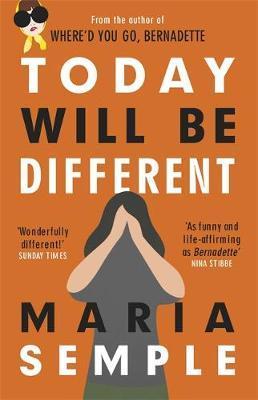
Today Will Be Different (Maria Semple, 2016)
Eleanor Flood knows she's a mess. But today will be different. Today she will shower and put on real clothes. She will attend her yoga class after dropping her son, Timby, off at school. She'll see an old friend for lunch. She won't swear. She will initiate sex with her husband, Joe. But before she can put her modest plan into action - life happens.
The bold one

The Power (Naomi Alderman, 2016)
Suddenly - tomorrow or the day after - teenage girls find that with a flick of their fingers, they can inflict agonizing pain and even death. With this single twist, the four lives at the heart of Naomi Alderman's extraordinary, visceral novel are utterly transformed.
The dark one

Gone Girl (Gillian Flynn, 2012)
On a warm summer morning in North Carthage, Missouri, it is Nick and Amy Dunne’s fifth wedding anniversary. Presents are being wrapped and reservations are being made when Nick’s clever and beautiful wife disappears. Husband-of-the-Year Nick isn’t doing himself any favors with cringe-worthy daydreams about the slope and shape of his wife’s head, but passages from Amy's diary reveal the alpha-girl perfectionist could have put anyone dangerously on edge. Under mounting pressure from the police and the media—as well as Amy’s fiercely doting parents—the town golden boy parades an endless series of lies, deceits, and inappropriate behavior. Nick is oddly evasive, and he’s definitely bitter—but is he really a killer?
The ones I still have yet to read
Difficult Women (Roxane Gay, 2017)
Fates and Furies (Lauren Groff, 2015)
Sharp Objects (Gillian Flynn, 2006)
The Roanoke Girls (Amy Engel, 2017)
What books would you recommend that feature unlikable women? And do you have any advice for being the unlikable female narrator you want to see in the world?
Also, check out this article by Roxane Gay called 'Not Here to Make Friends': https://www.buzzfeed.com/roxanegay/no...
The thought-provoking one

Americanah (Chimamanda Ngozi Adichie, 2013)
Ifemelu and Obinze are young and in love when they depart military-ruled Nigeria for the West. Beautiful, self-assured Ifemelu heads for America, where despite her academic success, she is forced to grapple with what it means to be black for the first time. Quiet, thoughtful Obinze had hoped to join her, but with post-9/11 America closed to him, he instead plunges into a dangerous, undocumented life in London. Fifteen years later, they reunite in a newly democratic Nigeria, and reignite their passion—for each other and for their homeland.
The feel-good one

The Cactus (Sarah Haywood, 2018)
People aren't sure what to make of Susan Green - a prickly independent woman, who has everything just the way she wants it and who certainly has no need for messy emotional relationships. At forty-five, she thinks her life is perfect, as long as she avoids her feckless brother, Edward - a safe distance away in Birmingham. She has a London flat which is ideal for one; a job that suits her passion for logic; and a personal arrangement providing cultural and other, more intimate, benefits. Yet suddenly faced with the loss of her mother and, implausibly, with the possibility of becoming a mother herself, Susan's greatest fear is being realised: she is losing control.
The witty one

Today Will Be Different (Maria Semple, 2016)
Eleanor Flood knows she's a mess. But today will be different. Today she will shower and put on real clothes. She will attend her yoga class after dropping her son, Timby, off at school. She'll see an old friend for lunch. She won't swear. She will initiate sex with her husband, Joe. But before she can put her modest plan into action - life happens.
The bold one

The Power (Naomi Alderman, 2016)
Suddenly - tomorrow or the day after - teenage girls find that with a flick of their fingers, they can inflict agonizing pain and even death. With this single twist, the four lives at the heart of Naomi Alderman's extraordinary, visceral novel are utterly transformed.
The dark one

Gone Girl (Gillian Flynn, 2012)
On a warm summer morning in North Carthage, Missouri, it is Nick and Amy Dunne’s fifth wedding anniversary. Presents are being wrapped and reservations are being made when Nick’s clever and beautiful wife disappears. Husband-of-the-Year Nick isn’t doing himself any favors with cringe-worthy daydreams about the slope and shape of his wife’s head, but passages from Amy's diary reveal the alpha-girl perfectionist could have put anyone dangerously on edge. Under mounting pressure from the police and the media—as well as Amy’s fiercely doting parents—the town golden boy parades an endless series of lies, deceits, and inappropriate behavior. Nick is oddly evasive, and he’s definitely bitter—but is he really a killer?
The ones I still have yet to read
Difficult Women (Roxane Gay, 2017)
Fates and Furies (Lauren Groff, 2015)
Sharp Objects (Gillian Flynn, 2006)
The Roanoke Girls (Amy Engel, 2017)
What books would you recommend that feature unlikable women? And do you have any advice for being the unlikable female narrator you want to see in the world?
Also, check out this article by Roxane Gay called 'Not Here to Make Friends': https://www.buzzfeed.com/roxanegay/no...
Published on June 12, 2018 14:27
May 15, 2018
The sincerest form of flattery
As you might have noticed, I've been reading a lot of epic poetry recently (as part of my work for uni), and thinking about different translations and adaptations of classical epics. Here are my thoughts on a few I've read over the past week or so (although, as ever, there are many more on my to-read list):
The Iliad and the Odyssey translated by E.V. Rieu
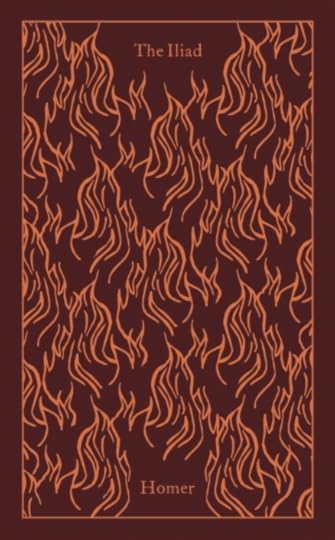
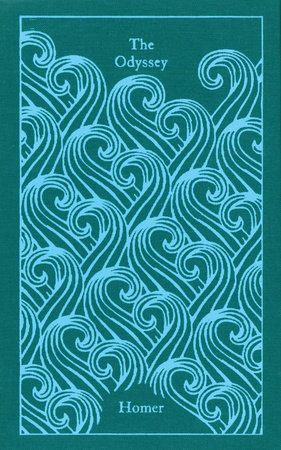
Rieu's translations of Homer were the first that I read, so I'll admit that I'm slightly biased, but I would still recommend this pair (which I own as a gorgeous, matching set in Penguin 1961 editions) for first-time readers of Homer, and I also still use them as my go-to translations. Given the timelessness of Homer's poems, Rieu's translations have dated well, and they are extremely useful in their literal approach. There is also something about the crisp, prose (yes, prose) style that I just savour. I was also pleasantly surprised, when I first read the Iliad and Odyssey (in English), by how readable they are, and that ease of reading definitely owed something to Rieu.
The Odyssey translated by Emily Wilson

For those who don't know, Emily Wilson is the first woman to translate the Odyssey (in its entirety) into English. And I think that is somehow both important and irrelevant. Unlike Rieu's prose, Wilson has opted for a more traditional approach using the same number of iambic pentameter lines as there are hexameters in the original, and while this has been criticised by some, I think it is a sensible choice. As anyone who follows me on Twitter will know, I am obssessed with the opening line of Wilson's translated: "Tell me about a complicated man." Overall, Wilson's translation is more or less what one might expect, striking a good balance between contemporary and traditional, although I did feel that some of her repeated set translations (especially epithets and the like) didn't always quite strike the right balance between literal and idiomatic. I would highly recommend Wilson's Odyssey, although there is something about it that made me think it is best enjoyed by someone already familiar with the text. Feel free to disagree. (Emily Wilson is also absolutely worth following on Twitter.)
Memorial: an Excavation of the Iliad by Alice Oswald

This is such a raw, beautiful, and powerful piece of poetry. It opens with a stark list of the names of the dead from the Iliad, which looks strikingly like a modern war memorial. Even turning the pages of this list is powerful stuff. Memorial made me realise how easy it is to become numb to most of the deaths in the Iliad, their volume their and brutality, and even to celebrate in some of them alongside the hero doing the killing. Oswald doesn't let her reader get away with that, nor does she take sides in the war, as she follows this stark list with an account, some longer than others as her source text dictates, of each character and their death. Fans of Oswald's poetry won't be disappointed by her stunning language, which really is intended to be read aloud (much as Homer was), coupled with translations of Homeric similes, and some subtle contemporary references. I think what really broke me, though, was her masterful use of repetition. This is truly heartbreaking stuff. (Don't make the mistake of reading it in a coffee shop, like I did.)
War Music by Christopher Logue

This is just incredible. Logue used multiple translations of the Iliad to create an adaptation of Homer's epic - this is by no means a translation. I don't even know where to begin with this one. Just read it. War Music is full of the most brilliant contemporary language and references, which are often wryly humorous, as well as vivid, graphic imagery, sometimes harsh, sometimes almost cartoonish. He plays with language, mimicking the sounds of Homer's Greek, as well as structure, tense, voice, and even font. Logue is doing something very different here, and I think it is definitely worth seeing.
Aeneid VI translated by Seamus Heaney
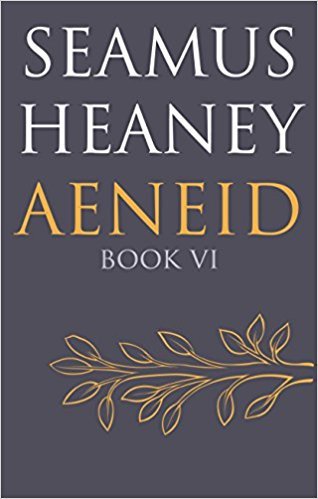
Heaney explains, in the introduction, that he chose Book VI to translate because his old Latin teacher could not help but pass on his love of this book to his students, even though they had been set Aeneid IX for their A Levels. I personally think it's an unusual choice of book, but each to their own. When I first read Heaney's Aeneid VI, I was a little disappointed, perhaps because I had wanted to read it for so long. Having thought about it, however, I think that what Heaney doesn't do is anything particularly flashy or radical, but what he does do it capture the spirit of the poem. Heaney's translation isn't mind-blowing in the same way that Logue's War Music is, but, on reflection, it feels remarkably like Vergil - and that's no mean feat. I particularly liked the way Heaney coupled iambic pentameter with Old English alliterative rhythms. Don't underestimate the humility of this one.
As an (related) aside, I also watched Troy (2004) at the weekend for the first time. It made me irrationally angry. Don't do it to yourself.
What did you think of these translations and adaptations? And what epic poetry would you recommend I bump up my to-read list? Let me know, either via Goodreads or Twitter!
The Iliad and the Odyssey translated by E.V. Rieu


Rieu's translations of Homer were the first that I read, so I'll admit that I'm slightly biased, but I would still recommend this pair (which I own as a gorgeous, matching set in Penguin 1961 editions) for first-time readers of Homer, and I also still use them as my go-to translations. Given the timelessness of Homer's poems, Rieu's translations have dated well, and they are extremely useful in their literal approach. There is also something about the crisp, prose (yes, prose) style that I just savour. I was also pleasantly surprised, when I first read the Iliad and Odyssey (in English), by how readable they are, and that ease of reading definitely owed something to Rieu.
The Odyssey translated by Emily Wilson

For those who don't know, Emily Wilson is the first woman to translate the Odyssey (in its entirety) into English. And I think that is somehow both important and irrelevant. Unlike Rieu's prose, Wilson has opted for a more traditional approach using the same number of iambic pentameter lines as there are hexameters in the original, and while this has been criticised by some, I think it is a sensible choice. As anyone who follows me on Twitter will know, I am obssessed with the opening line of Wilson's translated: "Tell me about a complicated man." Overall, Wilson's translation is more or less what one might expect, striking a good balance between contemporary and traditional, although I did feel that some of her repeated set translations (especially epithets and the like) didn't always quite strike the right balance between literal and idiomatic. I would highly recommend Wilson's Odyssey, although there is something about it that made me think it is best enjoyed by someone already familiar with the text. Feel free to disagree. (Emily Wilson is also absolutely worth following on Twitter.)
Memorial: an Excavation of the Iliad by Alice Oswald

This is such a raw, beautiful, and powerful piece of poetry. It opens with a stark list of the names of the dead from the Iliad, which looks strikingly like a modern war memorial. Even turning the pages of this list is powerful stuff. Memorial made me realise how easy it is to become numb to most of the deaths in the Iliad, their volume their and brutality, and even to celebrate in some of them alongside the hero doing the killing. Oswald doesn't let her reader get away with that, nor does she take sides in the war, as she follows this stark list with an account, some longer than others as her source text dictates, of each character and their death. Fans of Oswald's poetry won't be disappointed by her stunning language, which really is intended to be read aloud (much as Homer was), coupled with translations of Homeric similes, and some subtle contemporary references. I think what really broke me, though, was her masterful use of repetition. This is truly heartbreaking stuff. (Don't make the mistake of reading it in a coffee shop, like I did.)
War Music by Christopher Logue

This is just incredible. Logue used multiple translations of the Iliad to create an adaptation of Homer's epic - this is by no means a translation. I don't even know where to begin with this one. Just read it. War Music is full of the most brilliant contemporary language and references, which are often wryly humorous, as well as vivid, graphic imagery, sometimes harsh, sometimes almost cartoonish. He plays with language, mimicking the sounds of Homer's Greek, as well as structure, tense, voice, and even font. Logue is doing something very different here, and I think it is definitely worth seeing.
Aeneid VI translated by Seamus Heaney

Heaney explains, in the introduction, that he chose Book VI to translate because his old Latin teacher could not help but pass on his love of this book to his students, even though they had been set Aeneid IX for their A Levels. I personally think it's an unusual choice of book, but each to their own. When I first read Heaney's Aeneid VI, I was a little disappointed, perhaps because I had wanted to read it for so long. Having thought about it, however, I think that what Heaney doesn't do is anything particularly flashy or radical, but what he does do it capture the spirit of the poem. Heaney's translation isn't mind-blowing in the same way that Logue's War Music is, but, on reflection, it feels remarkably like Vergil - and that's no mean feat. I particularly liked the way Heaney coupled iambic pentameter with Old English alliterative rhythms. Don't underestimate the humility of this one.
As an (related) aside, I also watched Troy (2004) at the weekend for the first time. It made me irrationally angry. Don't do it to yourself.
What did you think of these translations and adaptations? And what epic poetry would you recommend I bump up my to-read list? Let me know, either via Goodreads or Twitter!
Published on May 15, 2018 15:06
December 30, 2017
2017 in Books
Number of books read: 55
Average rating: 4.2
Author stats:
- 58% female and 42% male
- 43% new authors and 12% authors I've read before
- 58% British, 20% American, and 22% other nationalities
Book stats:
- 5% rereads and 95% new reads
- 31% won in Goodreads giveaways, 22% gifts, 20% borrowed from the library, 15% borrowed from friends and family, and 12% bought
- 20% published in 2016, 18% published in 2017, 16% published before 1990, 13% published in the 2000s, 13% published in the 1990s, 9% published in 2015, 5% published in 2014, 4% published in 2013, and 2% published in 2012
- 36% with 300+ pages, 24% with 400+ pages, 20% with 200+ pages, 7% with 100+ pages, 4% with 500+ pages, 4% with less than 100 pages, and 2% with 600+ pages
Favourite Books of the Year:
 The Gene: An Intimate History (Siddhartha Mukherjee, 2016)
The Gene: An Intimate History (Siddhartha Mukherjee, 2016)
 The Hitchhiker's Guide to the Galaxy (Douglas Adams, 1979)
The Hitchhiker's Guide to the Galaxy (Douglas Adams, 1979)
 To Kill a Mockingbird (Harper Lee, 1960)
To Kill a Mockingbird (Harper Lee, 1960)
 Democracy and Its Crisis (A.C. Grayling, 2017)
Democracy and Its Crisis (A.C. Grayling, 2017)
 On Beauty (Zadie Smith, 2005)
On Beauty (Zadie Smith, 2005)
 The Last Days of Jack Sparks (Jason Arnopp, 2016)
The Last Days of Jack Sparks (Jason Arnopp, 2016)
Favourite New Authors: Raymond Chandler, Angela Marsons, Dylan Thomas, and Zadie Smith
Favourite Book Covers:
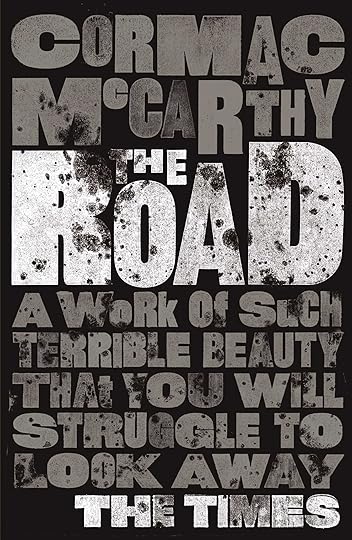
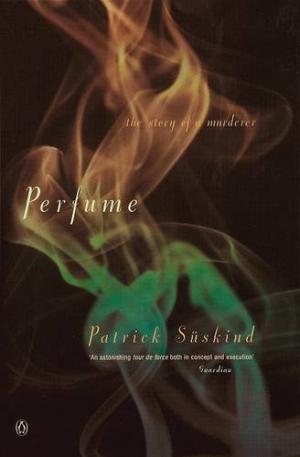

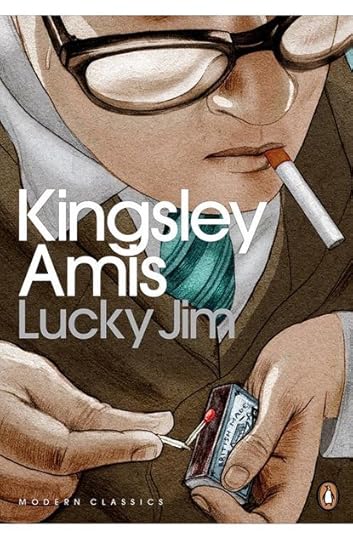

What books did you read this year? And what were your favourites?
Average rating: 4.2
Author stats:
- 58% female and 42% male
- 43% new authors and 12% authors I've read before
- 58% British, 20% American, and 22% other nationalities
Book stats:
- 5% rereads and 95% new reads
- 31% won in Goodreads giveaways, 22% gifts, 20% borrowed from the library, 15% borrowed from friends and family, and 12% bought
- 20% published in 2016, 18% published in 2017, 16% published before 1990, 13% published in the 2000s, 13% published in the 1990s, 9% published in 2015, 5% published in 2014, 4% published in 2013, and 2% published in 2012
- 36% with 300+ pages, 24% with 400+ pages, 20% with 200+ pages, 7% with 100+ pages, 4% with 500+ pages, 4% with less than 100 pages, and 2% with 600+ pages
Favourite Books of the Year:
 The Gene: An Intimate History (Siddhartha Mukherjee, 2016)
The Gene: An Intimate History (Siddhartha Mukherjee, 2016) The Hitchhiker's Guide to the Galaxy (Douglas Adams, 1979)
The Hitchhiker's Guide to the Galaxy (Douglas Adams, 1979) To Kill a Mockingbird (Harper Lee, 1960)
To Kill a Mockingbird (Harper Lee, 1960) Democracy and Its Crisis (A.C. Grayling, 2017)
Democracy and Its Crisis (A.C. Grayling, 2017) On Beauty (Zadie Smith, 2005)
On Beauty (Zadie Smith, 2005) The Last Days of Jack Sparks (Jason Arnopp, 2016)
The Last Days of Jack Sparks (Jason Arnopp, 2016)Favourite New Authors: Raymond Chandler, Angela Marsons, Dylan Thomas, and Zadie Smith
Favourite Book Covers:





What books did you read this year? And what were your favourites?
Published on December 30, 2017 10:43
December 1, 2017
Christmas Book Tree

You've probably heard that this year's (controversial) White House Christmas decorations include a book tree, which is a fantastic idea in theory. However, apart from the fact that the president will never read them, the only thing the books chosen by the White House have in common is that they're green. So, since a tree consisting of Esquire’s World of Golf, Robert Daley’s thriller Tainted Evidence, and Simon Stow’s political analysis American Mourning isn't the best idea, I've chosen some books which I think would make for a better Christmas book tree.
A Christmas Carol (Charles Dickens, 1843)
Would any Christmas book tree be complete without this Christmas classic? Everyone knows the story. Journeying with a series of spectral visitors through Christmases past, present, and future, Ebenezer Scrooge is ultimately transformed from an arrogant, obstinate, and insensitive miser to a generous, warm-hearted, and caring human being.
The Dylan Thomas Omnibus: Under Milk Wood, Poems, Stories and Broadcasts (Dylan Thomas, 1995)
I cannot recommend this beautifully dark book highly enough. Dylan Thomas has such a way with words. This is definitely one to savour, and with its stunning cover will make a perfect addition to any Christmas book tree.
Light on Snow (Anita Shreve, 2004)
When twelve-year-old Nicky, and her widowed dad Robert, find a baby in the snow, their secluded life out in the New Hampshire's woods are suddenly not so simple anymore. This book, which made me fall in love with Anita Shreve's writing, is written from the viewpoint of thirty-year-old Nicky, recalling that fateful December day.
Harry Potter and the Philosopher's Stone (J.K. Rowling, 1997)
The Harry Potter books are the perfect Christmas read - funny, magical, and comfortingly familiar - but for me the first one feels the most Christmassy. It's lighter in tone than the rest of the series, the innocence of its characters is sure to make you feel nostalgic, and Harry's Christmas Day is a crucial part of the plot.
Festive in Death (J.D. Robb, 2014)
Personal trainer Trey Ziegler was in peak physical condition. If you didn't count the kitchen knife in his well-toned chest. Lieutenant Eve Dallas soon discovers a line-up of women who'd been loved and left by Ziegler. But her ever-increasing list of suspects isn't the only list causing Dallas problems, as she also tries to juggle her Christmas shopping list, and the guest list for her and her billionaire husband's upcoming Christmas party.
The Snow Queen (Hans Christian Andersen, 1844)
In one of my all-time favourite stories, Kay and Gerda share a strong emotional bond, which is damaged by Kay's infection with the slivers from the shattered evil mirror. His eye and his heart are pricked, and it changes the way he sees the world, and makes his loving heart grow cold towards Gerda. But Gerda doesn't give up on him. When the Snow Queen steals away Kay, she goes searching for him, going on quite an odyssey and meeting some very unusual people along the way.
C. S. Lewis - A Life: Eccentric Genius, Reluctant Prophet (Alister E. McGrath, 2013)
Everyone knows The Lion, the Witch, and the Wardrobe, but not everyone knows the man behind the magic. This entertaining and highly readable biography of C.S. Lewis is the perfect addition to any Christmas book tree, especially given how gorgeous its book cover is. Alister McGrath brings the magic to life as he recounts the unlikely legacy of this Oxford don, who spent his days teaching medieval English Literature and his nights writing a bestselling fantasy series for children.
The Ice Beneath Her (Camilla Grebe, 2015)
Nordic noir makes the perfect accompaniment to winter nights, as does a twist you'll never see coming, and luckily for you this book has both. As winter descends on Stockholm, police officers Peter Lindgren and Manfred Olsson are investigating the murder of an unidentified young woman found decapitated in the house of Jesper Orre, the controversial, charismatic, and currently missing CEO of Clothes & More. What makes the case even more baffling is its remarkable similarities to an unsolved murder ten years ago.
A Wedding in December (Anita Shreve, 2005)
At an inn in the Berkshire Mountains, seven former schoolmates gather to celebrate a wedding. But their reunion becomes the occasion of astonishing revelations, as the friends collectively recall a long-ago night that indelibly marked each of their lives.
What books would you use in your Christmas book tree? Would they be linked by anything other than the colour green?
Published on December 01, 2017 14:24
October 16, 2017
Books to Read This Autumn
Autumn is my favourite season, and it's also the perfect season to curl up with a book (ok, so I say that about every season, but only because it's true). So here are some to get you started:
Classic: The Hound of the Baskervilles (Arthur Conan Doyle, 1902)
Alternative: The Last Days of Jack Sparks (Jason Arnopp, 2016) - unlike Sherlock Holmes, supernatural-sceptic Jack Sparks bites off more than he can chew in this refreshing, witty, and creepy book
Classic: The Picture of Dorian Gray (Oscar Wilde, 1890)
Alternative: Perfume: The Story of a Murderer (Patrick Süskind, 1985) - a dark and disturbing, beautiful tale of ugliness sure to please fans of The Picture of Dorian Gray (which really should be everyone)

Classic: Dracula (Bram Stoker, 1897)
Alternative: Buffy the Vampire Slayer, especially Halloween (2.6), Hush (4.10) (probably my all-time favourite episode), and Buffy vs Dracula (5.1) (it's as awesome as it sounds) - ok, so not technically a book, but I love it so much I don't care
Classic: Frankenstein (Mary Wollstonecraft Shelley, 1818)
Alternative: The Last Days of Night (Graham Moore, 2016) - although based on fact (which Frankenstein thankfully isn't), an equally thrilling and atmospheric tale of the power of science

Classic: Harry Potter and the Goblet of Fire (J.K. Rowling, 2000)
Alternative: Runemarks (Joanne Harris, 2007) - imagine Harry Potter if Hermione was actually recognised as the protagonist (because, let's face it, she deserved to be)
Classic: To Kill a Mockingbird (Harper Lee, 1960)
Alternative: Amsterdam (Ian McEwan, 1998) - a humorous and intelligent exploration of morality and mortality, which asks some uncomfortable questions (and, to be honest, it's written by Ian McEwan so it's going to be good)

Classic: The Road (Cormac McCarthy, 2006)
Alternative: The Girl with All the Gifts (M.R. Carey, 2014) - every bit as creepy and moving as The Road, but with zombies (trust me)
Classic: The Woman in White (Wilkie Collins, 1860)
Alternative: Gentlemen and Players (Joanne Harris, 2005) - a thrilling and intelligent mystery written from multiple perspectives, which, as Wilkie Collins is the master of, are carefully crafted to keep you on the edge of your seat
What are you reading this autumn?
Classic: The Hound of the Baskervilles (Arthur Conan Doyle, 1902)
Alternative: The Last Days of Jack Sparks (Jason Arnopp, 2016) - unlike Sherlock Holmes, supernatural-sceptic Jack Sparks bites off more than he can chew in this refreshing, witty, and creepy book
Classic: The Picture of Dorian Gray (Oscar Wilde, 1890)
Alternative: Perfume: The Story of a Murderer (Patrick Süskind, 1985) - a dark and disturbing, beautiful tale of ugliness sure to please fans of The Picture of Dorian Gray (which really should be everyone)

Classic: Dracula (Bram Stoker, 1897)
Alternative: Buffy the Vampire Slayer, especially Halloween (2.6), Hush (4.10) (probably my all-time favourite episode), and Buffy vs Dracula (5.1) (it's as awesome as it sounds) - ok, so not technically a book, but I love it so much I don't care
Classic: Frankenstein (Mary Wollstonecraft Shelley, 1818)
Alternative: The Last Days of Night (Graham Moore, 2016) - although based on fact (which Frankenstein thankfully isn't), an equally thrilling and atmospheric tale of the power of science

Classic: Harry Potter and the Goblet of Fire (J.K. Rowling, 2000)
Alternative: Runemarks (Joanne Harris, 2007) - imagine Harry Potter if Hermione was actually recognised as the protagonist (because, let's face it, she deserved to be)
Classic: To Kill a Mockingbird (Harper Lee, 1960)
Alternative: Amsterdam (Ian McEwan, 1998) - a humorous and intelligent exploration of morality and mortality, which asks some uncomfortable questions (and, to be honest, it's written by Ian McEwan so it's going to be good)

Classic: The Road (Cormac McCarthy, 2006)
Alternative: The Girl with All the Gifts (M.R. Carey, 2014) - every bit as creepy and moving as The Road, but with zombies (trust me)
Classic: The Woman in White (Wilkie Collins, 1860)
Alternative: Gentlemen and Players (Joanne Harris, 2005) - a thrilling and intelligent mystery written from multiple perspectives, which, as Wilkie Collins is the master of, are carefully crafted to keep you on the edge of your seat
What are you reading this autumn?
Published on October 16, 2017 04:28



